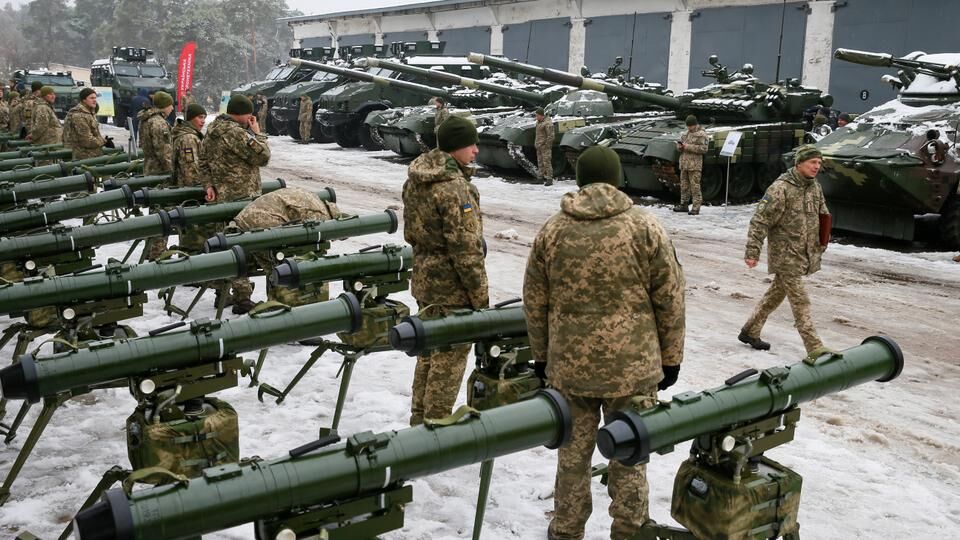The war in Ukraine and its prolongation has caused the weapons arsenals to be emptied and reach a critical situation that even the United States has not been immune to it. The US has increased orders for equipment to replace those which have been used. US Secretary of State Antony Blinken announces the allocation of another budget worth 1 billion 100 million dollars for Ukraine and Moldova.
Former US Ambassador to Ukraine William Taylor (2006-2009) claimed that the new composition of the US Congress will continue to support Ukraine and ‘I do not see any change in policies towards Ukraine after the elections. Before the election, I had announced that there would be no change, before the election, the majority in both parties supported all the aid packages for Ukraine that were presented to the Congress. The election results will not change much in this matter. Next month, there will be a vote on the new aid package to Ukraine worth 37.7 billion dollars’.
The United States is also studying expansion of the training program that the American military is currently implementing for Ukrainian military forces, including the training of 2,500 Ukrainian soldiers at an American base in Germany. The U.S. will train much larger contingents of Ukrainian troops in more sophisticated combat tactics, including how to coordinate infantry maneuvers with the artillery support.
NATO Secretary General Jens Stoltenberg emphasized at the NATO foreign ministers meeting in Bucharest that NATO is trying to allocate essential aid to Ukraine in this field. Everyone agrees on the urgent need to help Kiev, especially with air defense systems, but ensuring the proper functioning of the systems delivered to Ukraine is as important as the delivery of new systems. But at the same time, he believes that considering Poland’s recent request from the NATO treaty for the transfer of Germany’s proposed Patriot air defense systems to Ukraine, is still “too early” to make a decision regarding the provision of such weapons to Kiev to repel Russian aggression.
Ukraine is currently negotiating with Germany and the US to deploy Patriot systems in Ukraine. Germany is going to deliver seven “Gepard” anti-aircraft tanks to Ukraine in continuation of its arms assistance to Ukraine. Currently, 30 German-made air defense tanks are used in Ukraine, and more tanks will be delivered to that country. German Chancellor Olaf Schultz also promised to provide more Gepard anti-aircraft tank systems to Ukraine. Germany will continue to work to establish an effective and efficient air defense system in Ukraine.
The minister of economy of France announced the granting of a bilateral aid of 100 million euros to Ukraine. This aid will be added to the amount of the previous French aid to Ukraine in March 2022 worth 300 million euros. According to Paris, this will help Ukraine to maintain its stability in terms of economy and public services, and better resist the winter conditions and energy shortages caused by the destruction of Russia’s war against Ukraine, and its dire consequences for the Ukrainian people. Ukraine has confirmed that the fourth LRU multiple long-range missile launcher system arrived in Ukraine from France, and Ukraine now has more power to deter and destroy the enemies.
Britain confirmed the delivery of Brimstone missiles to the Ukrainian army. The delivery of the aforementioned guided missiles has been made as part of the British aid package to Ukraine. This aid can play an important role in deterring Russian aggression. The prime minister of Finland also announced that his country will provide more support to Ukraine to ensure that the country will win the war with Russia. Finland has sent 10 arms shipments to Ukraine so far.
According to the agreement with Germany, Slovakia delivered 30 BMP-1 armored personnel carriers to Ukraine. Slovakian BVP-1 armored vehicles are military sand infantry vehicles that have little differences with the former Soviet BMP-1 personnel carriers, and their production began in Czechoslovakia in 1968. Is. This person carrier has the ability to cross water sources in floating shape. Slovakia will receive 15 Leopard tanks, ammunition and related spare parts from Germany in exchange for the delivery of the mentioned personnel carriers to Ukraine.
Russian Foreign Minister Sergei Lavrov accused the West, including the United States and NATO, of directly participating in the conflict in Ukraine by providing weapons to Ukraine and training its soldiers. Russia has sent a note to NATO countries for sending weapons to Ukraine and insists that NATO countries are playing with fire by sending weapons to Ukraine. Any shipment containing weapons for Ukraine would become a legitimate target for Russia.
Allies of Ukraine claim that Russia has no chance to win the war and as a result they increase their support to Ukraine. Military aid to Ukraine is provided with an aim of enabling the country to achieve success in war operations, so that this will give Ukraine more ability to negotiate from a position of strength. In order for Ukraine to be able to resist, the Westerners are also making the process of delivering their weapons more regular, which is of course not an easy task. The war in Ukraine, known as the “first high-intensity war” in Europe since the Cold War, has been very costly for Russia and Ukraine.
The recent remarks of French President Macron, who announced that his country will continue to send weapons to Ukraine, but there are red lines in this field (including weakening its military forces and directly entering into the war, etc.) and Paris will never cross them, shows that European countries despite the arms aid they have had so far, have different obstacles and considerations ahead for the continuation of such aid.










0 Comments